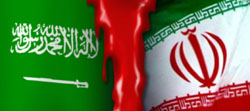 After a day of reading and listening and pondering, I've come up with a few more observations on the Great Turki Scoot. First, three points:
After a day of reading and listening and pondering, I've come up with a few more observations on the Great Turki Scoot. First, three points:1. Many articles portray Prince Turki al-Faisal as cooler toward W than was his predecessor, Prince "Bandar Bush." But Bandar himself had become alienated from our current president, primarily in response to Israel's ghastly treatment of the Palestinians. One does not have to read very closely between the lines of Bob Woodward's State of Denial to see that Bandar was the source for some of the most humiliating anti-Shrub anecdotes.
If Bush managed to annoy "Bandar Bush," imagine how Turki al-Faisal must feel. Imagine how everyone in Saudi Arabia must feel.
2. Never forget that line from Network: "The Arabs have taken billions from this country and they must put it back." Our economy depends on Saudi Arabia -- not just on their oil, but also on their re-invested dollars.
At the same time that Turki abruptly decided to "spend time with his family," the Saudis put in a $2 billion order for new jetliners. The gig went to European aerospace firms, not to Boeing. A foretaste of things to come...?
3. The Saudis are not happy about the prospect of impending American withdrawal from Iraq. As Sadrist Shi'ites gain ever-increasing power in Iraq, the Saudis have no choice but to defend Iraqi Sunnis.
Some Dems who opposed the war have begun to think twice about the ramifications of sudden disengagement. They may be worried about Saudi reaction. Like it or not, the Saudis control a large chunk of our economy.
 One key indicator of the Prince's thinking -- and of his standing in his homeland -- occurred on November 29, when his advisor Nawaf Obaid published an important opinion piece in the Washington Post.
One key indicator of the Prince's thinking -- and of his standing in his homeland -- occurred on November 29, when his advisor Nawaf Obaid published an important opinion piece in the Washington Post. In February 2003, a month before the U.S.-led invasion of Iraq, the Saudi foreign minister, Prince Saud al-Faisal, warned President Bush that he would be "solving one problem and creating five more" if he removed Saddam Hussein by force. Had Bush heeded his advice, Iraq would not now be on the brink of full-blown civil war and disintegration.The implication is clear. If American soldiers vacate, Iraq turns into the staging area for a proxy war between Iran and Saudi Arabia. And what would happen then?
One hopes he won't make the same mistake again by ignoring the counsel of Saudi Arabia's ambassador to the United States, Prince Turki al-Faisal, who said in a speech last month that "since America came into Iraq uninvited, it should not leave Iraq uninvited." If it does, one of the first consequences will be massive Saudi intervention to stop Iranian-backed Shiite militias from butchering Iraqi Sunnis.
Over the past year, a chorus of voices has called for Saudi Arabia to protect the Sunni community in Iraq and thwart Iranian influence there.
Interestingly, one result might be lower oil prices. If Saudi Arabia forced a price reduction, Tehran would feel a lot more pain than would Riyadh.
From the American point of view, this option may sound pretty good: Cheap gas and the return of our boys. Heck, the Republicans may even be able to swing a McCain victory in 2008.
However, the rulers of Saudi Arabia fired Obaid shortly after he published that piece. And now his boss, Prince Turki, has left his post with frightening speed. We cannot presume that Turki himself made this decision.
That reaction makes one thing clear: The rulers of Saudi Arabia do not want war -- proxy war or the other kind -- with Iran. The Saudis don't want the bloodshed and they don't want the low oil prices. Most of all, they don't want the instability. Their rule is already shaky, and they've seen how an unpopular war affected W's hold on power.
That scenario sounds pretty bad -- but believe it or not, worse things can happen. What if the Americans don't withdraw? What if they choose sides in the Iraqi civil war?
What if the Administration backs the Shi'ites? This was "Option 2" in the leaked Hadley memo.
 Word has it that Dick Cheney favors this option. No doubt, he discussed it at some length during his recent visit to Saudi Arabia. If you feel, as I feel, that Dick Cheney still makes American foreign policy, then growing evidence of a Saudi-U.S. rift takes on very ominous overtones.
Word has it that Dick Cheney favors this option. No doubt, he discussed it at some length during his recent visit to Saudi Arabia. If you feel, as I feel, that Dick Cheney still makes American foreign policy, then growing evidence of a Saudi-U.S. rift takes on very ominous overtones.Why? Because if we favor conquest by Iraq's Shi'ites, then Saudi Arabia would feel obligated to protect Iraq's Sunnis. Objectively speaking, Saudi Arabia would be at war with the United States.
We might not be fighting Saudi troops directly. But the rulers of Saudi Arabia possess two very formidable weapons which they could use against us: High oil prices and an avoidance of all American investment.
That kind of warfare could destroy the American economy.
I think the Saudis would prefer for American troops to stay in Iraq and somehow engineer a just peace between the warring parties. That won't happen. The first option -- quick American withdrawal, a bloody civil war in Iraq, proxy war between Sunni Saudi Arabia and Shi'ite Iran -- would be a disaster. That course of action could well destabilize the entire region in favor of the jihadists.
But Option 2 is even worse.
Watch oil prices. That indicator will tell you how this narrative will play out. So far, signs look bad.
8 comments:
Ah, Joseph. When I want the cold, hard (emphasis on hard) truth, I come here. And this entry has plenty of it. Iraq is now the "hellish quagmire" even Pat Buchannan was forced to predict it would be. Sound conclusions as always, except for this part:
"Heck, the Republicans may even be able to swing a McCain victory in 2008."
'Kay, even I can't seriously believe McCain could pull off a presidential win in '08. At least...not as a Republican.
And this from Saudi King Abdullah at the opening of the Arab summit:
"Our Arab region is surrounded by dangers. It is like a keg of gunpowder waiting for a spark to explode."
When kings stop mincing words, things are not good.
Kings and Queens are not a democracy. The end game for those may be the same as Saddam and it's good that they know this because, althought the US has gone very far to assure these that they may stay in power, even through recent coups; the real answer is they are not democracies and that is the real attitude of Americans, Republicans, Democrats and the CIA.
i am still waiting for the politicians to tell the american people the truth about thier misadventures
dick should swing
But Saudi rule depends on American support.
That said, it looks like this strategy -- they sell us oil and buy T-bills with the assets, and we in return offer them protection -- has pretty much exhausted itself.
Both parties are likely to lose. The house of Saud will get overthrown, and we'll lose the oil and the investment.
sofla said...
McCain, probably not. Too much pro-war. Chuck Hagel? Sure, somebody like him, who distanced himself from the war early and often.
But what is this point that a war with Iran would lead to low oil prices? Clearly, the prices would sky-rocket. Please clarify what it was you meant with this, Joe.
Basically, the same point was made in the Financial Times, and I thought it made sense. Saudi Arabia, if engaged in conflict with Iran (a proxy conflict, with both sides backing factions in Iraq), they would want to use oil as a weapon, though they would never admit to doing so. The Saudis can withstand a drop in price more easily than the Iranians.
If oil prices shoot up during an Iran/Saudi proxy war, the Suadis would find their opponent becoming wealthier.
If the Saudis' perceived enemy was the U.S., not Iran, then oil prices would go up.
Please understand that I never said "definitely" to this forecast. Anything could happen. I am simply saying that in this instance, the logic of what FT had to say makes a certain sense to me.
What if this senario unfolds and the Saudi's do drop the price of oil and the Russians put the squeeze on Europe, not to mention Ukrain and other Ex-Soviet Republics the US is courting like Georgia?
Russia and China are both quitely cuddling Iran (Iran persumebly will be a member of the Shanghai Group shortely)and would like to see an American defeat in Iraq as well as seeing a wedge between US and Saudi Arabia.
I just think that limiting the senario to Iran, Saudi Arabia and US is not realistic. Oil prices effect more than just the Americans.
What if Chavez jumps in the ring, he has said as much (He will come to the aid of Iran), if not militarily but by the same proxy methods(oil as weapon).
Post a Comment